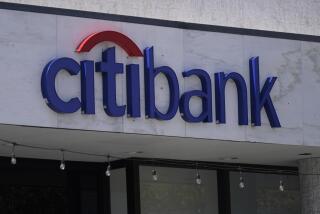Column: Sorry your mom is dead. If only sheâd been hit by a bus, weâd pay your claim
If Rebecca Anderson had died by falling down an elevator shaft, Citi Group would have made good on its promise to wipe clean all her credit card debt. The company also would have come through if sheâd been hit by a bus.
But Anderson died suddenly from a heart complication, and Citi ruled that because this was a ânatural deathâ and not an accident, it wasnât covered by the credit protection program Anderson had paid for in case of her untimely demise.
âI could understand if they wonât cover you if itâs a suicide,â Andersonâs daughter, Kara Schmidt, told me. âBut what they seemed to be saying was that if you suddenly drop dead, you have to be the right kind of dead.â
Yup, thatâs pretty much what they were saying.
Credit card protection is a form of insurance to cover yourself in the event of unforeseen setbacks such as a job loss, disability or, yes, death.
Card issuers typically charge a percentage of whatever balance youâre carrying, and in return they say theyâll make sure you donât run into trouble â such as racking up late fees or getting your credit score dinged â if you start missing payments.
In Citiâs case, the companyâs Payment Safeguard Classic program costs cardholders 85 cents a month for every $100 of credit they carry on their balance.
Among the benefits, according to Citiâs website, is that your balance will be will be wiped clean âin the event of Death and after 24 months of Job Loss or Disability.â
This can be a way of protecting loved ones. If you die with a balance due on your plastic, your estate is still responsible for paying off the debt. In some cases, your spouse could be left holding the bag.
So Schmidt, 30, who lives in Grantsburg, Wisc., was pleasantly surprised while recently getting her momâs financial affairs in order to see on one of her Citi statements that she had been enrolled in Payment Safeguard.
Anderson had a balance of $3,763.28 at the time of her death at age 54.
âThat might not sound like a lot,â Schmidt said. âBut $3,000 is a lot of money for us.â
She went to Citiâs site and clicked on a link for what to do in the event of a program memberâs death. This brought up a âdeath benefit formâ requiring information about the deceased and a certified copy of the death certificate.
Schmidt submitted everything Citi requested. A few weeks later, she received Citiâs response in the mail.
âThe program Terms and Conditions specify that the death must be the result of accidental injury that occurred within 90 days prior to the date of death,â it said. âThe death was not the result of an accidental injury. Therefore, the benefit cannot be activated.â
Huh?
Schmidt scoured Citiâs site and could find no mention of such a limitation. She searched online and found a column I wrote in 2011 about problems related to Citiâs Credit Protector Program, an earlier version of Payment Safeguard.
One of the issues I discovered at the time was that you werenât even shown the terms and conditions until after you signed up, which hardly seemed fair.
Schmidt gave me a call. As we chatted, I also looked over Citiâs site and could find no mention of the accidental injury requirement in outlining Payment Safeguardâs death benefits.
And what do you know? There was still no link to the terms and conditions â the fine print of the deal. What you see is what you get.
âIâve looked and Iâve looked and Iâve looked, and I couldnât find a thing that said it has to be a certain kind of death,â Schmidt said.
Her momâs death certificate attributes the primary cause of her passing to ventricular fibrillation, which the American Heart Assn. calls âthe most serious cardiac rhythm disturbance,â preventing the heart from pumping blood.
It can be caused by damage from a heart attack. Schmidt said her mother had experienced cardiac trouble several years ago.
Ventricular fibrillation isnât an accidental injury. Itâs an unexpected medical emergency.
But itâs certainly not self-inflicted and itâs not the sort of thing most people could anticipate. It is, more or less, bad luck.
Which is what insurance is designed to protect against â particularly coverage that doesnât require a preliminary medical exam, as some life insurance policies do.
At worst, Citiâs Payment Safeguard appears to be a particularly cruel bait and switch. At best, itâs an egregious example of a business failing to adequately disclose important conditions.
Jennifer Bombardier, a Citi spokeswoman, told me the company no longer sells the Payment Safeguard Classic protection purchased by Anderson years ago. However, it continues to âservice existing customers.â
Bombardier said the coverage Anderson purchased covers accidental death but not ânatural death,â which apparently means any demise not involving a grisly mishap. Iâm not sure I understand the distinction.
A piano falls on you and Citi will honor its obligations, but you have a fatal stroke and it wonât?
In any case, itâs unclear how well Citi discloses this. I repeatedly asked to see the programâs terms and conditions, but Bombardier never sent them. Theyâre only available online to cardholders after they log in.
Itâs also hard to understand why the next of kin of a cardholder wouldnât have ready access to the terms when submitting a claim. They clearly have a stake in the matter.
All that aside, Iâm pleased to say Citi has chosen to do the stand-up thing.
âWe understand that Ms. Andersonâs children have experienced a heartbreaking loss and would like to forgive any outstanding balance on the account at this difficult time,â Bombardier said.
I passed that along to Schmidt, who said she was grateful to have the problem resolved.
I encourage anyone with a credit protection plan to take a close look at their contract. Make sure the coverage you thought you purchased is indeed the coverage you have.
Hopefully Citi and others will do a better job of making sure their customers are informed â and will honor their commitments
If your pledge is to make good âin the event of Death,â then thatâs all there is to it.
At least thatâs how it should be.
David Lazarusâ column runs Tuesdays and Fridays. He also can be seen daily on KTLA-TV Channel 5 and followed on Twitter @Davidlaz. Send your tips or feedback to [email protected].
More to Read
Inside the business of entertainment
The Wide Shot brings you news, analysis and insights on everything from streaming wars to production â and what it all means for the future.
You may occasionally receive promotional content from the Los Angeles Times.











